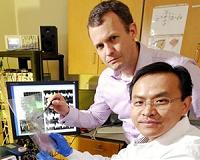 |
Rotterdam, Netherlands (UPI) Nov 22, 2010 Dutch researchers say they've developed a way to tell a person's approximate age from one drop of blood, a test that could be used in crime investigation. Scientists at Erasmus University Medical Center in Rotterdam say as a forensic technique it could be used to revive police investigations that have hit a dead end, AAAS ScienceMag.org reported Monday. The blood-age test relies on a peculiarity of T cells, immune cells in the body that recognize and fight microbial infections. As T cells develop, they modify their DNA to recognize a wide variety of bacteria and other pathogens. In the modification, some DNA is left over that is useless to the T cell, which discards it, researchers say. The amount of discards in the body can be used to estimate a person's age since people produce fewer and fewer T cells as they get older. "We take advantage of this waste product" in estimating a person's age from a sample of blood, forensic molecular biologist Manfred Kayser says. The researchers found a correlation between the number of T cell DNA fragments and age, allowing them to pinpoint how old a person was to within plus or minus 9 years. It's a wide range but enough to place suspects into generational categories, which could be helpful to police, Peter de Knijff, head of the forensic laboratory at Leiden University Medical Center in the Netherlands, says. With this new test, de Knijff says, at least police can narrow down their suspect pool. "This is the best we have right now," he says.
Share This Article With Planet Earth
Related Links All About Human Beings and How We Got To Be Here
 Study Reveals Neural Basis Of Rapid Brain Adaptation
Study Reveals Neural Basis Of Rapid Brain AdaptationAtlanta GA (SPX) Nov 23, 2010 You detect an object flying at your head. What do you do? You probably first move out of the way - and then you try to determine what the object is. Your brain is able to quickly switch from detecting an object moving in your direction to determining what the object is through a phenomenon called adaptation. A new study in the Nov. 21 advance online edition of the journal Nature Neuroscien ... read more |
|
| The content herein, unless otherwise known to be public domain, are Copyright 1995-2010 - SpaceDaily. AFP and UPI Wire Stories are copyright Agence France-Presse and United Press International. ESA Portal Reports are copyright European Space Agency. All NASA sourced material is public domain. Additional copyrights may apply in whole or part to other bona fide parties. Advertising does not imply endorsement,agreement or approval of any opinions, statements or information provided by SpaceDaily on any Web page published or hosted by SpaceDaily. Privacy Statement |